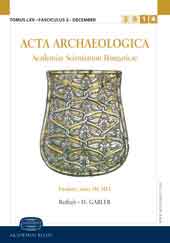THE FRONTIER IN THE EGYPTIAN MYTH OF THE STATE: A NUBIAN PERSPECTIVE
THE FRONTIER IN THE EGYPTIAN MYTH OF THE STATE: A NUBIAN PERSPECTIVE
Author(s): László TörökSubject(s): Archaeology, Cultural history, Ancient World, Cultural Essay
Published by: Akadémiai Kiadó
Keywords: Egyptian myth; Old and Middle Kingdoms; Dynastic Egypt;
Summary/Abstract: In his discussion of the relationship between Roman imperial expansionism and the Roman notion of fines imperii, C. R. Whittaker, the author of seminal studies on the frontiers of the Roman Empire, notes that there was... an unwillingness to accept that Rome had any boundaries. That feeling derived perfectly rationally from certain ideological principles. It is an extraordinary fact that no Roman geographic description or map tells us where the boundaries of empire actually lay or whether there were ever any marker stones. It is true that two places are marked as fines Romanorum on a section of the Peutinger table depicting Syria and Mesopotamia... these fines look as if they were the boundary between the provinces and a client state (possibly Palmyra), since underneath one is written fines exercitus Syriaticae, showing where the military responsibility of the Roman army ended. It could have been a trading post as well, since the words commercium barbarorum are also written... [I]deology is no guide to the reality of frontiers... there is no hint of a scientific assessment of the strategic advantages and disadvantages... On the contrary, it is the conventional cries of imperialism that are deafening.
Journal: Acta Archaeologica Academiae Scientiarum Hungaricae
- Issue Year: 59/2008
- Issue No: 2
- Page Range: 225-230
- Page Count: 6
- Language: English
- Content File-PDF

